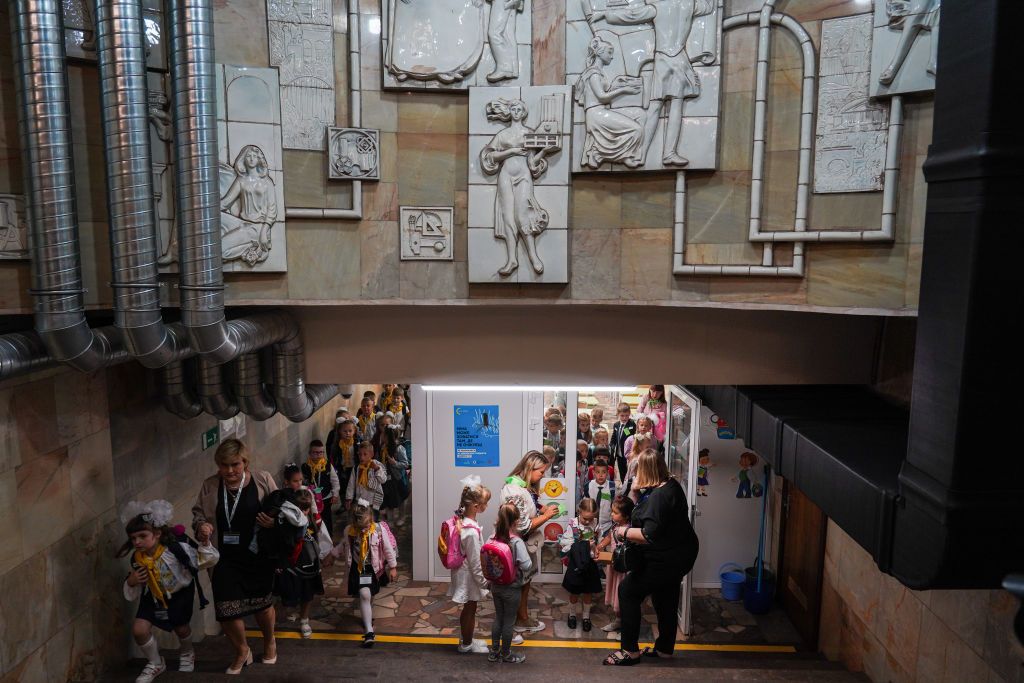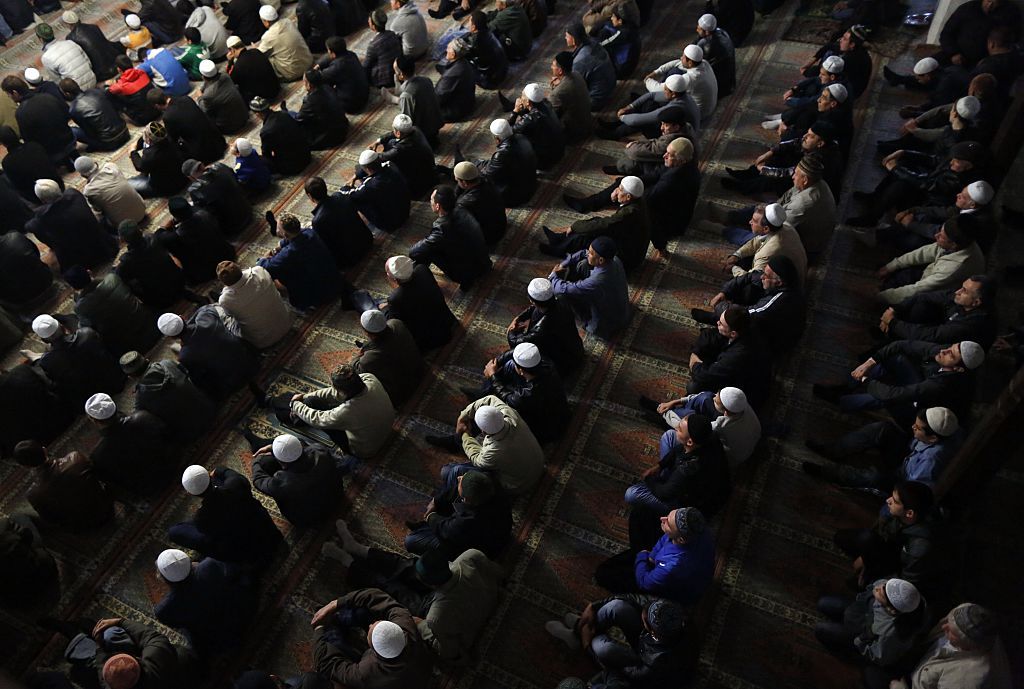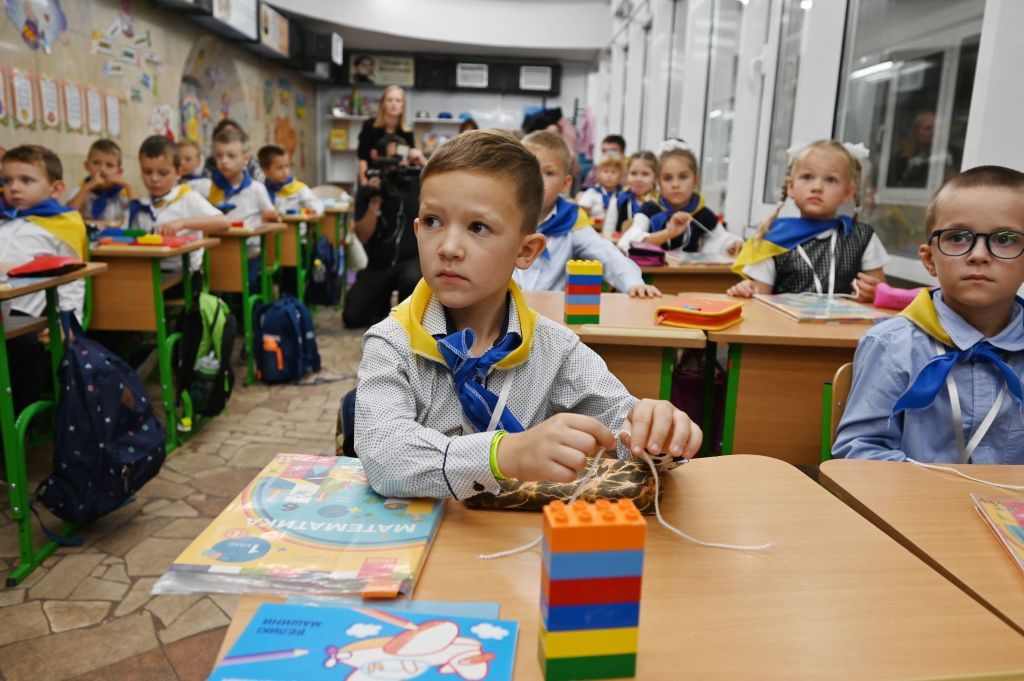Editor’s Note: This article was published by the blog “The Counteroffensive with Tim Mak” on March 17, 2024, and has been re-published by the Kyiv Independent with permission. To subscribe to "The Counteroffensive," click here.

There’s a low rumbling that never quite stops below Kharkiv’s iconic Independence Square. This morning, the sound is a metro train thundering into Universytet Station, just underneath the school children learning the basics of the four seasons and the seven days of the week.
But the vibrations and sounds can be anxiety-inducing considering that, within just a block or so, this area has been attacked by Russian missiles multiple times. And, being less than 32 kilometers (20 miles) from the Russian border, it is within range of Russian artillery.
It is here that psychologist Roman Cherkaskiy oversees dozens of children learning underground, in a school purpose-built to keep them safe from attacks.
Ukraine’s children have been devastated by the outbreak of war – endangering the next generation and the country’s future potential. There have been more than 500 children killed and 1,250 wounded due to the Russian invasion, according to the Ukrainian government.
But the damage doesn’t stop merely at physical harm. Children’s learning has been deeply disturbed by the violence: the constant disruptions of air alarms, growing student anxiety, and a shortage of teaching equipment and reliable internet have contributed to a massive backslide in academic performance: 63% of Ukrainian teachers in one survey said that performance has declined.
These are all effects that these schools in Kharkiv are trying to combat – and, in particular, prevent the frequent disruption of classes by holding them underground.

“In normal schools, when there (is) an air alert, children constantly have to break their educational process in order to go down to the basement,” explained a school district administrator. “Here we actually have a different situation, because the moment we manage to put them here and start their class, they don't have to disrupt their studying process for anything.”
In fall 2023, the local education administrators picked five underground locations that could be used for schools. With funds from the municipal budget, as well as aid from the European Union and UNICEF, they converted this former passageway connecting two metro stations into a series of classrooms. The process took about a month.
Roman always wanted to be a psychologist, but he never expected to be working his dream job here. Among the rumblings and the long pipes filled with ventilated air, parents bring their students to school here each day.
Aside from being one of Kharkiv’s first underground schools, the "Metroshkola," or “Metro-school” in English, is also trying new educational approaches. Each classroom here has both a teacher and a psychologist present at all times.
Standing in front of the sound-proofed classroom window that dampens the sounds of the metro below, Roman explains how he tries to dampen the stresses of war, too.

“We talk about everything connected to the war. We explain how to deal with stress independently, who to turn to when you are having a panic attack or if you are stressed or scared,” he said.
But fundamentally, children in Kharkiv are like children from anywhere else.
“(Most people) think 'Oh, they must have troubles related to the war,’ but no. They have usual kid problems,” Roman told The Counteroffensive. “Like one of them was telling me that they are really concerned that their rabbit is sick. You know, for us, that may sound like something even silly… but they take it really, really seriously. And for them it is an actual problem.”
Despite this not being an ordinary school or an ordinary city, the children are still very much ordinary children. In fact, these children face problems that any child might struggle with:
“We work on how to say ‘no,’ or how to come up to the blackboard… a lot of kids get very stressed when they are being examined by a teacher.”
Having in-person school serves the purpose of getting these young students the necessary socialization they need for healthy development.

Due to a lack of space, students rotate on a daily basis: every other day, they show up for in-person classes; on the other days, they will learn online. And even though they’ve built up some capacity, only about 3% of the city’s children – the lucky 2,190 – will be able to use the underground schools.
But the Russian invasion has still robbed them of the fresh air and outdoor playtime that children in safer places get. Being underground, there is no hopskotch, nor ball courts; no place for tag or hide and seek.
"This is still a city, where, if it's not a missile, then an air alert every 10 minutes or something," said Valeriy Shepel, who works for the Kharkiv Department of Education. "There’s no way for the children to go outside and play. Because of the proximity to the (Russian) border here, we don't have time to react."
As we speak, children are constantly coming to and fro, escorted by teachers to the bathroom at the end of the hall – the former metro bathrooms. The children seem somewhat oblivious to the circumstances: this war has now become deeply embedded into their lives now.
Just before we depart, we see a teacher start a song and start to dance. The kids jump to their feet and move back and forth excitedly. They wave at the strange journalists who are nearby, perhaps uncertain about why they have such interest in their classes. Other children eagerly eat sandwiches for lunch and laugh with one another.
With all the violence outside, they are very much the definition of innocent kids. Russia's war against Ukraine isn’t merely about soldiers defending their homeland. These kids are what those soldiers are fighting to defend.
Editor’s Note: The opinions expressed in the op-ed section are those of the authors and do not purport to reflect the views of the Kyiv Independent.












